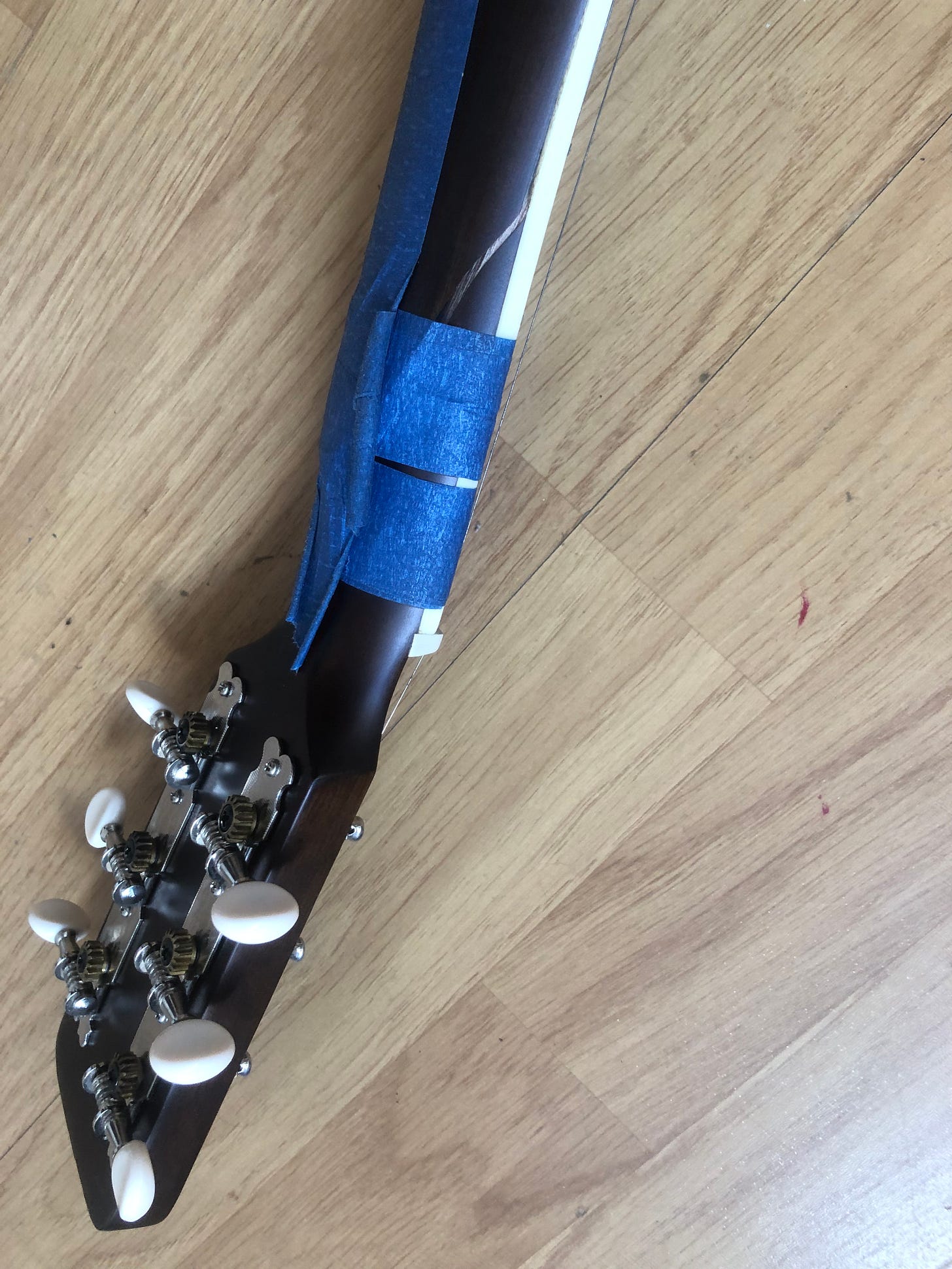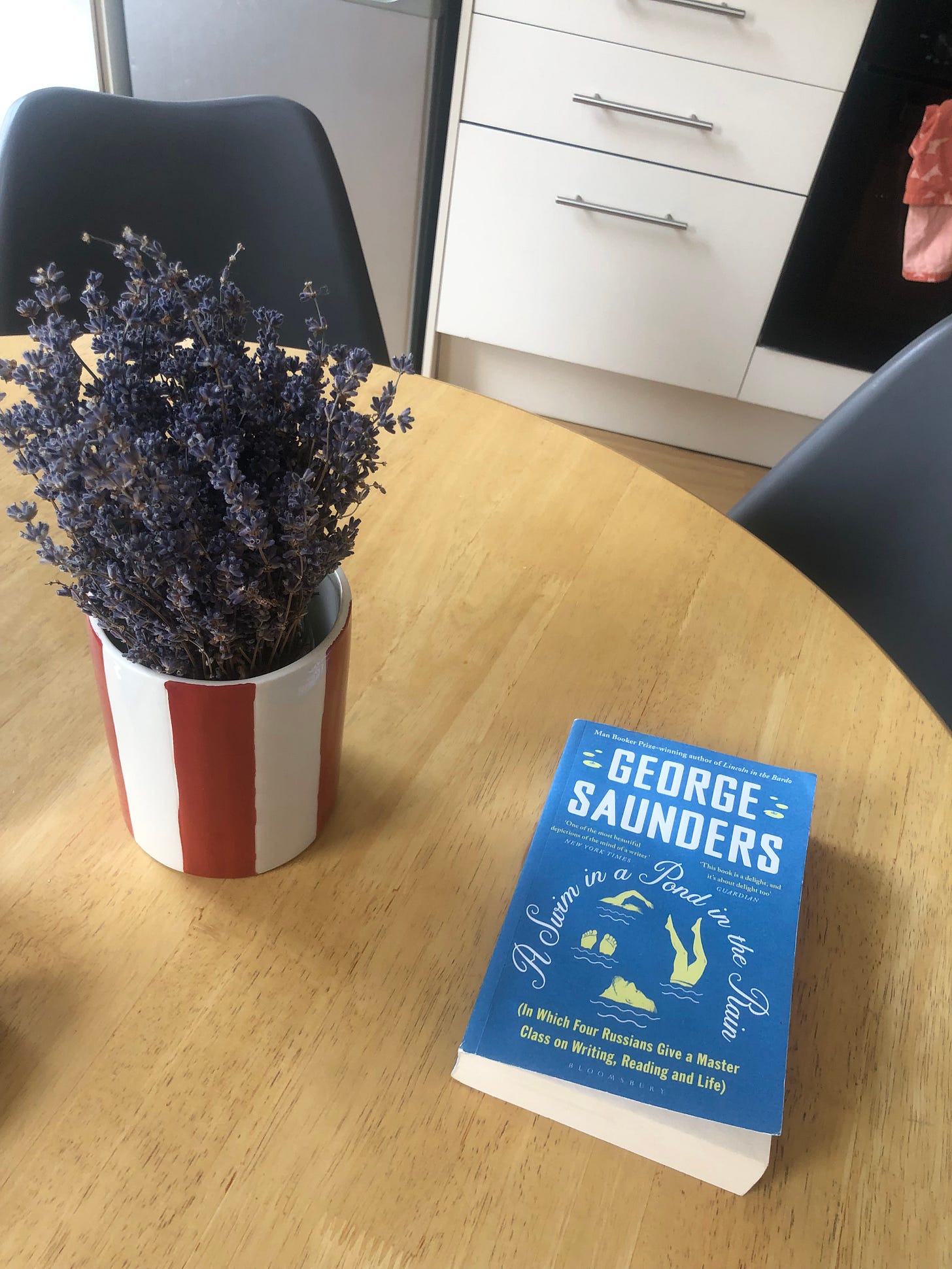What if there's more there than meets the eye?
I cracked the neck of my guitar a couple of months ago. My god did it ruin my day...
When it happened it was one of those moments where you just wish you could jump in a time machine and undo it. One little instant of carelessness resulting in outsized damage.
With an eye towards protecting the guitar’s wooden finish from the hard surface of our bedroom floor, I put the guitar on top of my washing basket. It fell off the basket and this is the result….
Doesn’t that just make you want to throw your fist through a window?
But it links in with writing/art in a way that’s interesting—to me at least.
I’m reading a book on writing at the moment by Booker Prize winning author George Saunders, called A Swim in the Pond in the Rain (He’s got a Substack page which is well worth subscribing to as well)
It’s different to most writing books as it takes short stories from well known Russian authors Tolstoy, Gogol etc. and analyses why they’ve managed to stand the test of time. This probably sounds pretty dry to anyone who hasn’t read a lot of these classics, but trust me they’re not what you’d think they are.
One such story featured in this book is The Singer, by Ivan Turgenev.
Now, from a first-hand reading perspective this story is a slog... It describes every character in painful unnecessary detail, takes forever to get to the point and is paced like a math’s textbook.
But it’s good. Good in the same way my guitar’s neck cracking is good.
Without going too much into plot. In a nut shell, the story is about two singers competing for the title of “who’s the best singer in town,” judged by a pub full of locals—each of whom, thanks to Turgenev, I know more about than I’d like to.
One of the singers is a technical genius. Everyone is thinking, “shit how is anyone going beat this guy?” The other singer is your classic rough-edged artist. Though not as proficient as a classically trained vocalist, he’s able to use his expressive voice to pull at the heart strings of the locals and claim the title.
Now I’m about to get very meta here, but you could take this overall message and translate it to the vessel of the story itself and ask, “Was Turgenov deliberately making a point here? By making the story technically flawed, yet still delivering a powerful result, is he proving his own hypothesis? Or was the hypothesis born from frustration at his own first-hand challenges in this area?
Either way, suddenly the boredom you experienced while reading suddenly feels worth it. Though nothing about the reading experience has changed, this minor shift in perspective suddenly makes it become something more than the sum of its parts.
Another great example of this is listening to Charles Manson’s music. First of all, the act of seeking this stuff out feels a bit naughty in itself. But the secondary benefit is the same as the above. As a singer-song writer he’s midlevel at best. Just your average sixties flower power hippy. If you listen to it through the filter of, “This shit was written by a murderous cult leader,” however, it instantaneously develops more layers.
Now back to my guitar.
When the accident first happened. I was devastated. I’m overseas at the moment. I splashed out for this instrument partly because I’m a lunatic who can’t go more than a few days without plucking away. But also, because I assumed I’d be able to sell it when I leave the country.
With a much-depleted bank account I can’t justify buying another one.
All isn’t lost however. I’ve figured something out.
If I try to play it like an ordinary guitar—particularly open chords—it sounds terrible. I guess the location of the crack low on the neck means the more I play on that part of fretboard (and particularly on the low E string for some reason) the quicker it will go out of tune.
But if I play on the lighter strings, up on the higher frets, I can still make it sound somewhat musical—and more importantly exorcise the daily demon compelling me to play.
This has naturally forced me to change my technique a bit as well as learn new chord voicings and inversions to keep things interesting for myself. Which overall is helping me develop my playing in ways I otherwise wouldn’t have had the patience to do.
There are parallels to this in Haruki Murakami’s writing. He is a Japanese author, who was not yet fluent in English when he began his career. However, he discovered early on that this limitation forced him to use simpler language and develop a stripped down style of prose that people love. Viewed through the lens of “does this man have expansive skills in written English?” you might answer no. But that doesn’t matter when you allow yourself to stray from the typical conventions.
All that matters in art is the effect it has. Was it good or not?
It’s not just art where this applies either.
I used to apply a similar principle to physical exercise when I was competing a lot. I’d identify the exercises that I found most mentally taxing, then deliberately avoid learning any technique that might make them easier. I’d also scatter these types of exercises across different weeks and alternate so I wouldn’t gain the natural comfort level that comes with familiarity. All serving the purpose of having a reliable pool of go-to-suffering that never got easier.
If you were assessing the muscle groups I was working, you likely would have observed that I’d failed to strengthen them and therefore, the exercises had been a waste of time. But I wasn’t looking for strength, I was practicing time spent in pain (Yes I’m aware this makes me come off as a psycho) Something I knew I wouldn’t be able to achieve by approaching these exact same exercises in a conventional manner. This concept featured in my short story Plums and Tobacco, if you haven’t read that one yet, it’s here:
Plums and Tobacco (a short story)
I Shoulder feint. Step. Throw your jab for real. No power though. Just touch him. Nose, eye, doesn’t matter. Pay attention to where his head goes after you land. Circle out of range. Wait till he throws something. Get a read on his timing. No counters yet. The first round’s about collecting data.
I’m not sure if I’ve made any sense here or whether there’s anything meaningful in this idea. I guess it’s just an interesting way of finding novelty in the ordinary. I think people are too quick to jump on the idea that they understand all the objects in their world. “Things have their use and nothing more.”
Maybe, or maybe you’re just not being creative enough.







